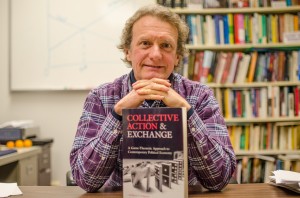Bill Ferguson’s ’75, Economics, first published book, Collective Action and Exchange: A Game-Theoretic Approach to Contemporary Political Economy, hit the academic shelves over the summer. The book is the product of several years of writing, theorizing and collaborating, focuses on collective action, game theory and related subjects and is aimed at upper-level undergraduates. Ferguson began the work in late 2008 and spent a year on sabbatical researching and collaborating with some of the best minds in the field of political economy.
Many of those connections were made in the sabbatical Ferguson took in the 2010-2011 academic year. His first visit, to Indiana University, gave him the opportunity to work with Elinor Ostrom, who, in 2009, became the only woman to win a Nobel Prize in economics, which she shared with Oliver Williamson from University of California, Berkeley.
Some sections of the book are heavily influenced by Ostrom’s lifelong work in the self-regulation of groups sharing natural resources, such as fisheries or irrigation systems. Ferguson said that Ostrom, who passed away in 2012, was very enthused about his book and had planned to write the foreword.
Other parts of the book, such as his study of social networks, reveal the impact of Ferguson’s six-week stays at University College London and George Mason University. By the end of his sabbatical, Ferguson estimates he had written three-fourths of his manuscript, which he completed and edited in the following years.
Stanford University Press published Ferguson’s text in July and Ferguson added it to the required reading list for his Applied Game Theory class this fall. In the past, he used a series of academic pieces covering a broad range of issues. But such a piecemeal approach left some things to be desired.
“I did a lot of work drawing the links and filling the spaces. … The difference in having the book is that I can organize the material more coherently,” Ferguson said.
The falling dominoes on the book’s cover are a metaphor for game theory, which Ferguson describes as “a way of systematically conceptualizing strategic behavior.” Ferguson’s book uses game theory as a means to examine collective action problems, issues where a group has free access to a resource or service.
From tackling environmental pollution to housemates dividing up chores, collective action problems come in all shapes and sizes and Ferguson investigates the use of game theory to understand what drives the decisions of their actors. The text also investigates political economy, which studies the formal and informal politics that influence economic action. Ferguson’s prime example, which he examines in depth, is the way in which the Civil Rights Movement was able to influence popular opinion and power structures to affect change in the 1960s. What Ferguson thinks makes his book unique is the connections it makes between varied economic approaches.
“[I took] ideas about how information functions in an economy, ideas from behavioral economists who are drawing on ideas from sociology and psychology, certain ideas from political science concerning power in political institutions and positions, and I’m putting all these ideas together in a single narrative. And to my knowledge, nobody has every put this large combination of ideas into such a narrative,” Ferguson said.
Ferguson has been pleased with the entire book-writing process.
“It’s been a rewarding experience for me, and I think it illustrates … that relationship between teaching and scholarship that, in some way, you can really only get at places like Grinnell,” Ferguson said.






















































